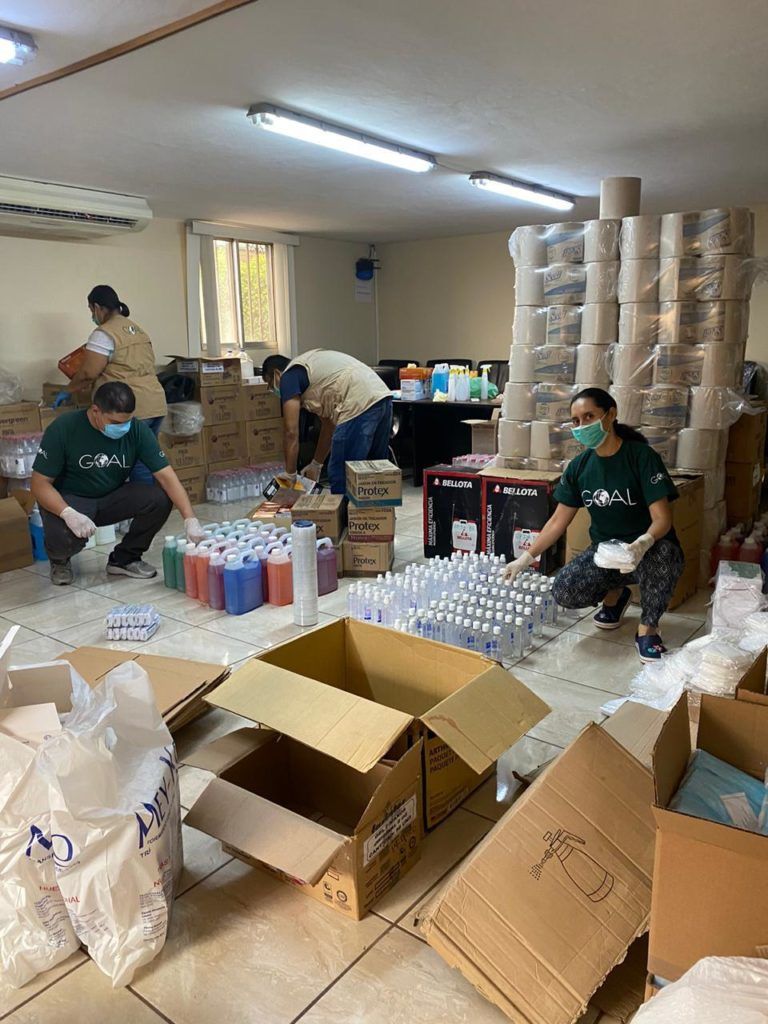 Stories
Stories
July 15, 2020 • 5 min read
As the world grapples with the unprecedented COVID-19 public health crisis, GOAL is committed to doing everything it can to protect some of the world’s most vulnerable populations in the Global South.
GOAL is calling for a community-centred, integrated approach to be at the heart of the international response, and on the international community to urgently work together to prevent the loss of life and livelihoods by focusing on actions in six key areas.
Health
COVID-19 has overwhelmed and stretched even the most well-resourced health systems in the world. In the world’s poorest countries where health systems are chronically underfunded and understaffed, COVID-19 will present huge challenges. Health systems will require significant support to ensure they can continue to provide the services and treatments their communities need.
Across all country programmes GOAL is working in coordination with local partners, Ministries of Health and key UN agencies to prevent the spread of the disease. GOAL is supporting local governments to establish and maintain infection prevention and control standards which will protect health workers and patients and minimise the risk of transmission. GOAL’s Risk Communication and Community Engagement (RCCE) centres on Community Led Action (CLA) which enables people to understand COVID-19 and take contextually appropriate action to protect themselves and their communities while continuing with daily life. Community members decide how they will ensure good hygiene practices, re-design community hubs to facilitate physical distancing, stay at home without going hungry, monitor entry into the community, seek medical attention for those who are sick, and shield older people and those with underlying medical problems. GOAL is using this approach with communities in Sudan, South Sudan, Haiti, Sierra Leone, Niger, Zimbabwe, Malawi, Ethiopia, Uganda, Niger and Honduras.

USAID health centre in South Kordofan, Sudan
GOAL will also continue to support the strengthening of health systems to build longer-term resilience to infectious diseases and other shocks and stresses, including in Sudan, South Sudan, Ethiopia and Sierra Leone. GOAL will support the Ministry of Health and other health partners to undertake analysis of the health system in relation to the most likely shocks (such as disease outbreaks) and stresses (such as climate change) to reveal where preparedness efforts to ensure continuity of services needs to be focused.
GOAL is asking that:
- Community healthcare initiatives must be at the centre of the world’s response to COVID-19. Lessons learned from the response to Ebola outbreaks show that community engagement is key to slowing and stopping the spread of these deadly diseases.
- Donors and Governments commit to long term investment in building resilient and adaptive national health systems which include a multisectoral approach to the integration of disaster risk management and public health; and universal and non-discriminatory access to medical treatments, equipment and vaccines.
- The international community must take coordinated action to put in place a global system for Early Warning and Response to infectious diseases.
Case Study
Handwashing and a borehole fence in the fight against COVID-19 in Buhunya- B village
GOAL Uganda is implementing a sustainable water sanitation and hygiene (SWASH) project in Namayingo District. The project is promoting good hygiene and sanitation with communities for better health outcomes specifically reducing acute watery diarrhoea rates among people, especially children below 5 years. Activities focus on increasing access to safe and clean water and using the Community-Led Total Sanitation (CLTS) approach to help communities achieve Open Defecation Free status.
Wafula Douglas (55 years old), married with 6 children, became a village champion for the CLA approach in Buhunya B village in Namayingo District. His children, aged between 4 and 15 years, all fetch water from the local borehole, often playing with other children while they wait. To protect his children and community from contracting COVID-19, he worked with his CLA group to ensure that hand washing with soap and water was used by all members of the community. His CLA group also mobilised members to construct hand washing facilities and a fence at their main water point, a borehole constructed by GOAL in 2017.

Nabwire Grace washing her hands in Uganda.
Following the outbreak of COVID-19, GOAL secured funding from Irish Aid under the Emergency Response Fund Scheme (ERFS) to support the Namayingo District Task Force (DTF) in responding to the pandemic. This was done through strengthening district coordination, promoting awareness through mass media and dissemination of IEC materials on COVID-19, and supporting community preparedness and response through a community-led approach.
To promote awareness on the cause, symptoms and prevention of COVID-19 in Uganda, GOAL trained Health Assistants and Village Health Teams using the Community Led Action approach (CLA) whilst promoting awareness via radio information campaigns. With community mapping done, high risk households were identified and triggered.
Some women from the CLA group took it upon themselves to build the fence at the borehole and called upon people to observe social distancing when drawing water. Mrs. Anyango Mary, one of the women said;
‘usually constructing boreholes is done by men. However, following the outbreak of COVID-19, we need to change our attitude as women because we can equally do what men can do and together we stand in the fight against this pandemic regardless of gender roles.’’
As a result of the community triggering and the collective action of the CLA group, all members of the community are now washing their hands with soap and beginning to change their attitudes and behaviours. The CLA group were able to share information and knowledge acquired from the CLA approach to help their community to realize how dangerous and infectious COVID-19 is.

